#WCET16
Published by: WCET | 10/20/2016
Tags: Social Media, WCET, WCET Annual Meeting, WOW Award
Published by: WCET | 10/20/2016
Tags: Social Media, WCET, WCET Annual Meeting, WOW Award
Hello WCETer’s!
Today I’d like to share the highlights of the meeting from my point of view as a new WCET staff member and first timer at the WCET Annual Meeting. As I, sadly, could not be everywhere at once, Mollie and Russ kindly donated their notes to fill out this post! Thanks both of you and our active WCET Tweeters for extra info!
Before I get started, a public service announcement:
You can access meeting materials by use of the Program tab on the annual meeting website. You can also watch several of the recorded sessions. If you presented at the meeting and would like to share your materials then please email them to Megan Raymond. If you would like to add your take-aways, comments, bloopers, fun stories, etc. about the meeting please do so in the comments below!
Back to our regularly scheduled program…
The WCET 28th Annual Meeting was held October 12-14th in Minneapolis, MN. Thank you to the Marriott City Center hotel, which was a great venue and host hotel! I have to say, the food especially (and the red and green lit bar for our opening reception) was great!
I’ve attended several conferences and this was my first time attending a WCET event. While I’ve enjoyed other conferences I’ve attended, I noticed that each conference excelled at either community building or facilitate learning experiences. At the WCET Annual Meeting, not only did I meet new people but I learned valuable information during the sessions and discussed significant topics in higher education and educational technology.
A majority of attendees this year were returning WCET’ers.
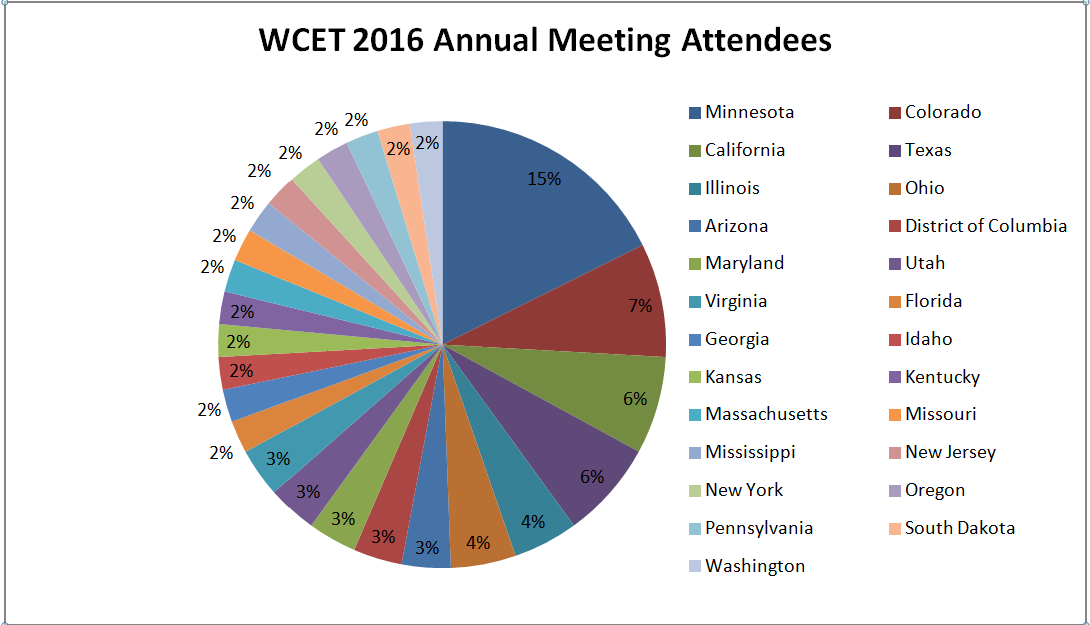
There were 396 attendees from 47 different states and the District of Columbia, with the most from Minnesota (way to represent!). WCET attendees represented many different job categories.
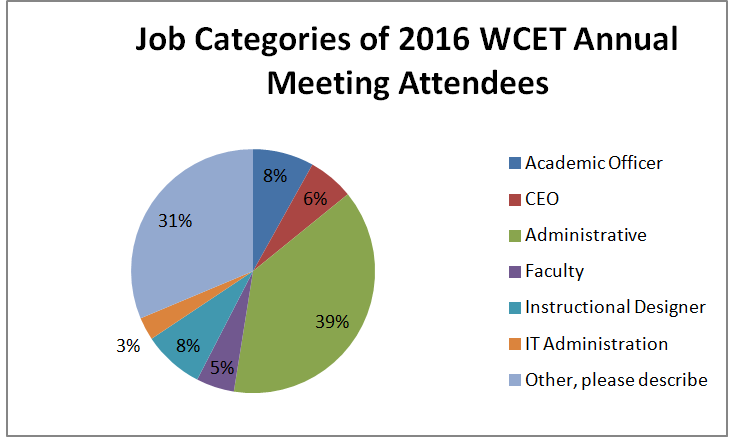
The meeting started Tuesday with the WCET Steering Committee and Executive Council meetings. The Steering Committee dedicated themselves to moving the fields of educational technology and education forward. The Chair of the Committee, Nick White, said that:
“Our job is to accelerate and facilitate change. We need to think about our members and what their needs are.”
The Annual Meeting sessions covered topics from student success, Open Educational Resources (OER), Accessibility and competency-based education. Speakers presented information on change management, adaptive learning, student privacy and 21st Century Credentials.
…two dozen senior level academic leaders engaged in a provocative discussion of:
Jaime, the Chief Educational evangelist with Google, told us about the impact of education, which brought him from his hometown of Hell’s Kitchen, NY (not the Hell’s Kitchen restaurant up the street from the conference hotel), to not only speaking at the White House during the Beating the Odds Summit, but speaking to us at WCET16! He spoke of power of education to disrupt poverty and invited us to consider how we can change the focus of education to prep our students to answer “what problem do you want to solve?” instead of “what do you want to be when you grow up?” Educational technology can be developed to prepare our students to be innovative creators and problem solvers.
Thursday started early as Rosa Calabrese, WCET’s digital 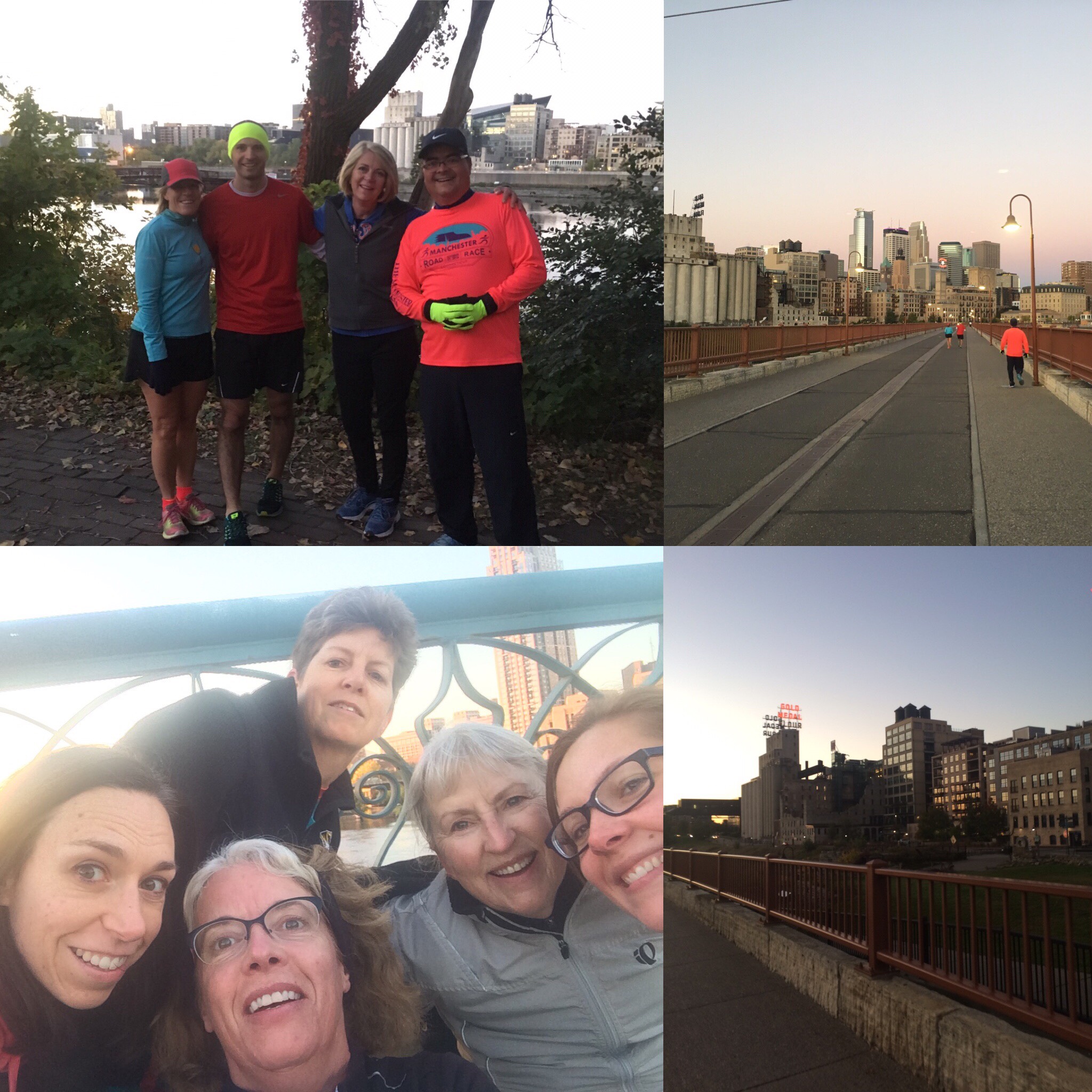 and project services coordinator/extraordinaire, and I took groups for walks and jogs around downtown Minneapolis (for the record, I did not jog and thank you to my group for navigating so well!).
and project services coordinator/extraordinaire, and I took groups for walks and jogs around downtown Minneapolis (for the record, I did not jog and thank you to my group for navigating so well!).
We had a great and chilly time and I especially enjoyed the view while going over the Mississippi River using the Stone Arch Bridge.
After a great breakfast it was on to sessions for the day!
Over the past three years, adaptive learning has gone from an ill-defined concept in higher education to an important category of teaching and learning technology.
Eric Frank, CEO of Acrobatiq, said that:
“when considering adaptive learning resources, he uses the refrigerator model. My refrigerator of adaptive resources includes complete meals, or all the necessary ingredients I need to make my meal, or the refrigerator is empty and has zero resources. The latter is really tough to scale! What resources does your institution have to implement adaptive learning?”
We need to fill up the adaptive learning refrigerator with resources!
The presenters reminded attendees that adaptive or personalized learning is not new. Today it’s just scalable. Adaptive products today are standing on the shoulders of giants from decades of research on brain science and learning science.
Dale Johnson encouraged allowing faculty to try adaptive learning several times, saying,
“Give faculty breathing room. Let them know it’s okay to fail.” He advises using the “Three Times Teaching” theory. Allow faculty to teach an adaptive learning course at least three times. This will allow them to truly understand how their role is different, how to use the analytics, what interventions their students may or may not need. You can also ask your faculty: If you didn’t have to lecture, what would you like to do in class? Create? Evaluate? Analyze? Apply?”
Then, give faculty the time and space to try out those options.
During this session, Suzanne Tapp and Justin Louder, Texas Tech University (TTU), provided updates on a Texas Tech student run captioning lab pilot (2014-2015). The lab was student run by four undergraduate students observed by a graduate student. Students were trained on best practices found in Described and Captioned Media Program Captioning Key.
Campus wide captioning processes and policies were brought up several times by presenters and attendees. At TTU they are completing their captioning policy. The policy will require that all hybrid and online classes and all face-to-face classes with a Letter of Accommodation (LOA) require captioned videos.
Video captioning is handled depending on the priority and length.
I’m looking forward to seeing Texas Tech’s publication on best practices in captioning! Visit this link for the slides from this session.
We were fortunate to have Amy Laitinen, director for higher education with the Education Policy program at New America, and Van Davis, Associate Vice President of Higher Education Research and Policy at Blackboard, update us on the latest with the “regular and substantive interaction” requirements for distance education and competency-based education (CBE). The U.S. Department of Education’s Office of Inspector General has issued reports criticizing two regional accrediting agencies in their oversight of competency-based programs, especially with respect to interaction regulations. A new report regarding Western Governor University’s implementation of “regular and substantive interaction” is due soon and is expected to be negative. It could be costly to WGU in terms of financial aid eligibility. Such a ruling will have a chilling effect on CBE.
WCET joins Amy, Van, and others in trying to figure out solutions in working with the Department and Congress in creating solutions. WCET will continue to update you and work on advocacy positions.
The WCET Awards Lunch honored the WCET Outstanding Work (WOW) award winners and the higher education professionals who won the Richard Jonsen and the Sally Johnstone awards.
A WOW Award recognizes outstanding efforts by member institutions and organizations in applying an innovative, technology-based solution to a challenging educational need. The institutions listed below were honored for their solutions:
The videos showcasing these innovative projects (shown during the lunch) will be available soon. More information will be posted on the WOW award webpage.
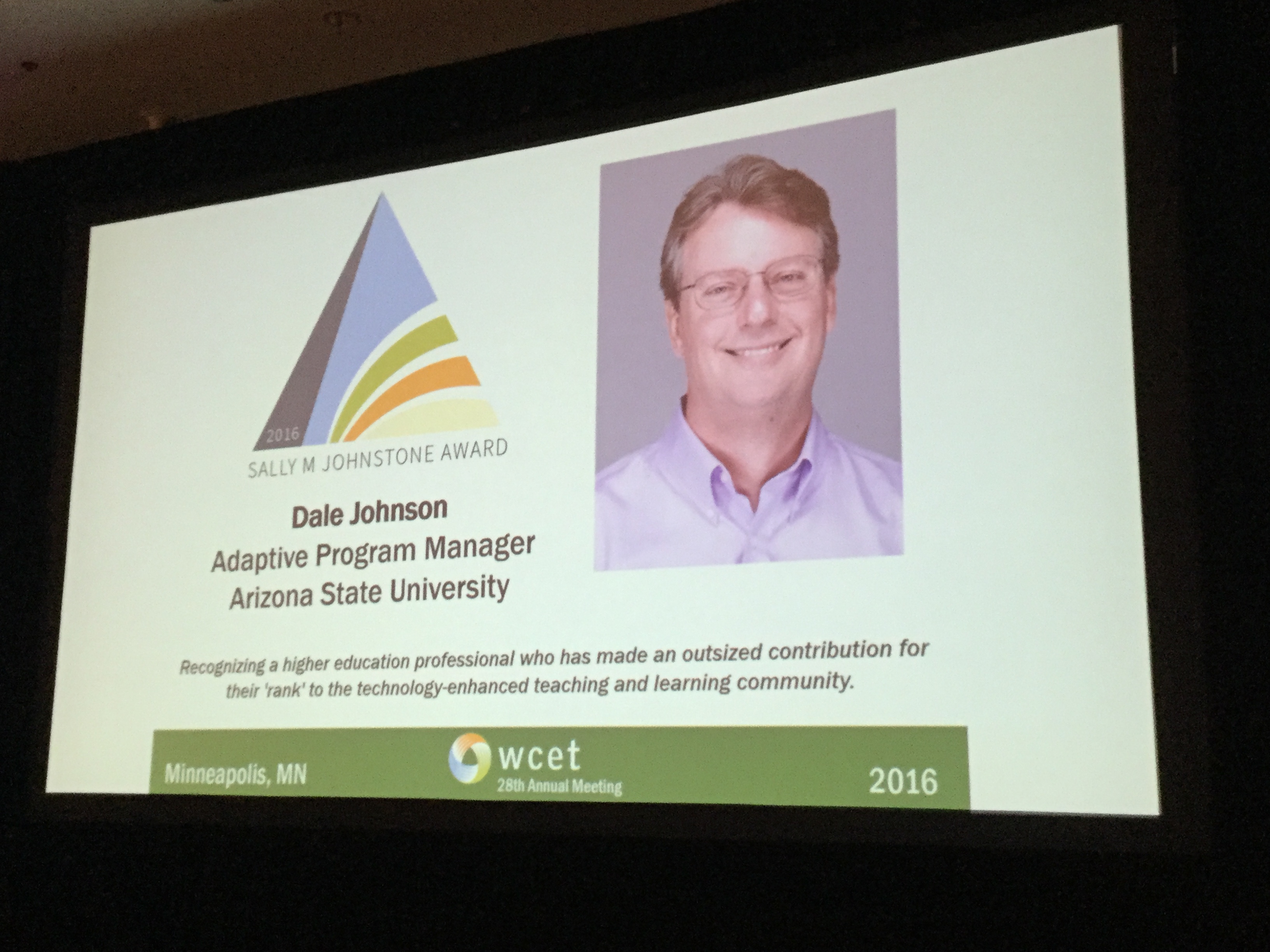 The Sally M Johnstone Award, named in honor of WCET’s founding executive director, recognizes a professional who has made an exceptional contribution to technology enhanced teaching and learning. The award acknowledges leadership and excellence in practice.
The Sally M Johnstone Award, named in honor of WCET’s founding executive director, recognizes a professional who has made an exceptional contribution to technology enhanced teaching and learning. The award acknowledges leadership and excellence in practice.
The inaugural winner of the award is Dale Johnson, adaptive program manager at Arizona State University.
The Richard Jonsen Award is given each year to an individual who has made a significant contribution to the e-learning community and WCET during his or her career. 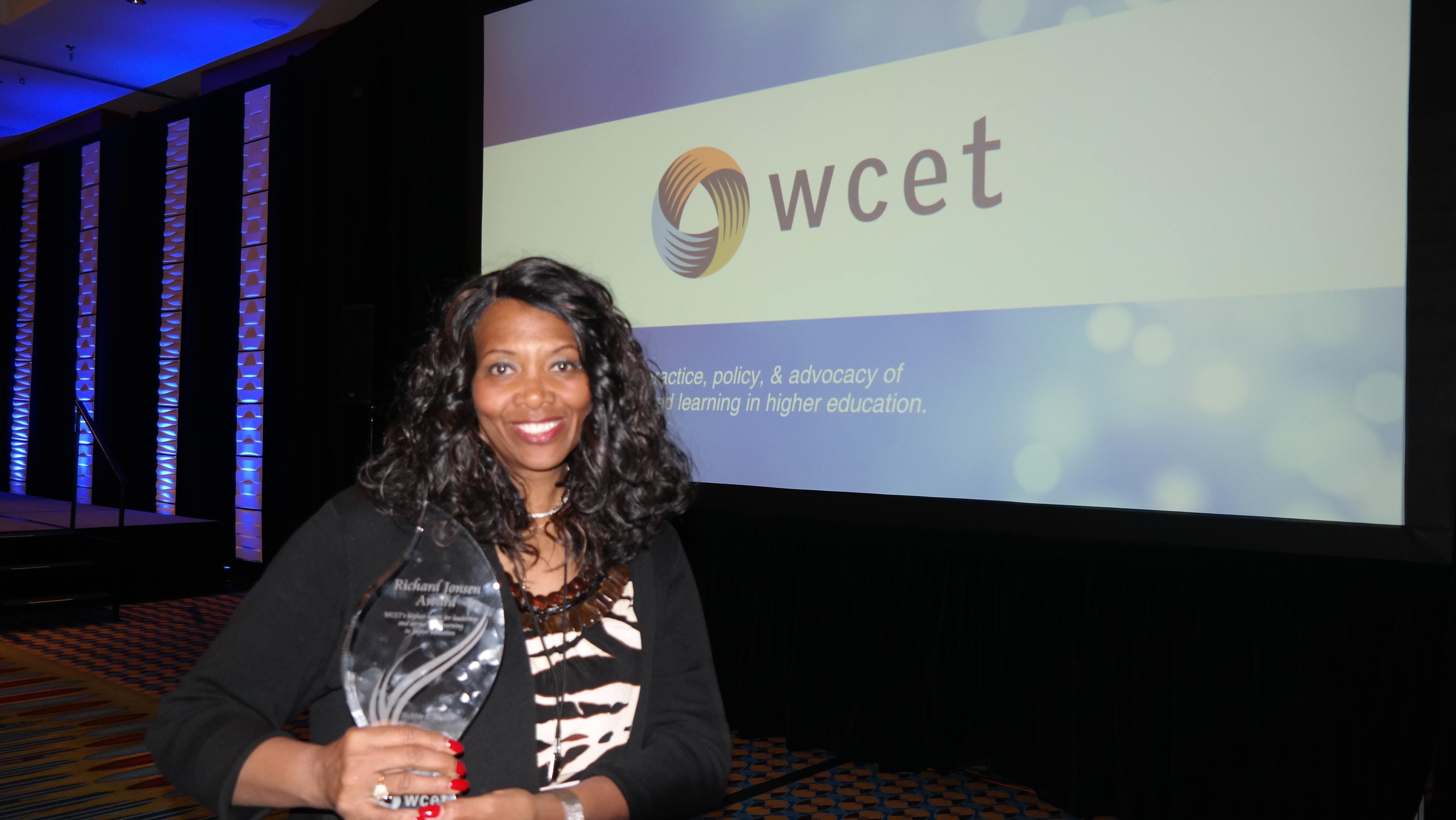 The Richard Jonsen Award was established in 1998 to recognize the contributions of Richard (Dick) Jonsen, who, as WICHE’s executive director, founded WCET.
The Richard Jonsen Award was established in 1998 to recognize the contributions of Richard (Dick) Jonsen, who, as WICHE’s executive director, founded WCET.
WCET was honored to present Dr. Robbie Melton, Associate Vice Chancellor of Mobilization and Emerging Technology for the Tennessee Board of Regents, with this award. Dr. Melton is not only known for her research on mobile apps for education, but her efforts to improve opportunities for learners and willingness to assist others in the technology community. She even helped us with taking very fun VR photos at the meeting! I agree, Robbie, “Life is good!”
The hiring process is changing for graduates. Major industries are moving away from required degrees for positions and instead want to know what applicants can actually do.
The Credential Transparency Initiative is an organization working to is to improve transparency in the credentialing marketplace.
Panelists discussed the following:
Friday dawned with yoga for a few, a networking breakfast for most and a steering committee working meeting for others! Sessions included discussions on possible combinations of professional certifications and academic coursework, accessibility, accreditation and student metrics. WOW award winners continued to present on their solutions (WGU’s borrowing initiatives and University of Central Oklahoma’s STRL tool).
This panel was a lively discussion with Karen Solomon (Higher learning Commission), Ellie Fogerty (Middle States Commission on Higher Education), and Leah Matthews (Distance Education Accrediting Commission). They updated us on the regional accreditors new focus on institutions with low completion rates. The panelists talked about the increased expectation by the Department of Education and Congress that accrediting agencies act as compliance officers, which is ill-suited to the accreditation model of peer review.
The accrediting agencies are eagerly awaiting the plans that the next administration will have for them. There is an “explosion” of dual credit applications and they expressed concern that some (or, perhaps many) institutions are not ready to assure the quality of their offerings.
The final session of WCET 2016 featured Vernon Smith as a moderator discussing higher education innovation with Missy Bye, Unviersity of Minnesota, Jeff Grabill, Michigan State, Thomas Yen, University of Wisconsin-Madison, and Julie Legault, Amino Labs.
In this session we heard about the Internet of Things Lab at University of Wisconsin-Madison, where students can conduct research and hands-on experimentation in and IoT sandbox. Thomas Yen spoke about training students to connect their personal passion with what they want to do in life. So that wherever they go, whatever company they work for, they can find passion in whatever they are doing. Jeff Grabill, Associate Provost for Teaching, Learning, and Technology at Michigan State University (MSU), introduced us to the MSU Hub for Innovation in Learning and Technology, where Spartans are working together to develop projects like the Brody Engagement Center, an art exhibit designed to showcase the connections between art and science, in spaces such as the Media Sandbox, a collaborative arena to promote creative application of media knowledge through an integrated program. Missy Bye talked about University of Minnesota’s work in the Wearable Product Design Center, a think-tank designing and producing smart clothing. Visit their page for information on their projects (the idea of smart clothing protecting our firefighters in hazardous environments really struck me!). Finally the Creative Director and CEO of Amino Labs, Julie Legault, spoke with us about her journey founding Amino Labs and her work making science and technology much more approachable and intriguing.
My three takeaways /thoughts from this session:
I’m so happy I had the opportunity to attend WCET 2016 and meet with other WCET’ers! I could not have asked for a better welcome as a first time attendee and as a new staff member with WCET. Thanks to all of you for the warm welcome and thank you to my team at WCET for making the time so special for me!
Want more highlights? We had a very stimulating, informative and entertaining discussion on twitter (#WCET16). Relive the chatter with the storify!
I’m looking forward to the 29th annual meeting in Denver. I hope to see you there October 25-27th, 2017,
Thanks,
Lindsey
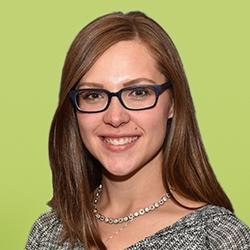
Lindsey Downs
Manager, Communications
WCET – WICHE Cooperate for Educational Technologies

2 replies on “#WCET16”
Thanks for this excellent review. Your summary with links serves to enhances our learning experience. Having everything in one place prompts and facilitates additional thought to topics explored during the week. My only challenge at WCET meetings is that I can’t participate in all the sessions. Your blog certainly helps fill that gap. Thanks to you and WCET!
Thanks for this overview! It was an exciting — and for me — very productive conference. And as someone who has been told my whole life that I look like Mary Tyler Moore, I appreciate the pic of the statue!